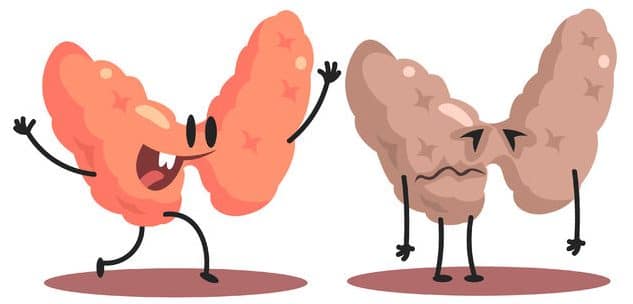
I have been a full-time naturopathic doctor for 7 years now. 7 YEARS! Just seeing that figure in writing is a bit of a shock. I have spent most of that time specializing in Women’s Medicine and hormone balancing, including a great bulk of my practice which is spent helping those who have hypothyroidism and Hashimotos thyroiditis. Two questions I get quite commonly are “Can I stop taking my thyroid medication” and “Is it bad for me?”
The short answers are 1. Maybe, and 2. No.
To fully answer these questions, it is important to understand what thyroid does for us. The thyroid gland is a butterfly shaped gland which sits in our neck and makes T4 (the longer lasting thyroid hormone) which the rest of the cells in the body convert to T3 (a more stimulating, shorter-lived thyroid hormone). Thyroid hormone has a significant effect on the body’s metabolism, it increases the consumption of oxygen by the cells in the body, it speeds up digestion, aids in brain function, interacts with sex hormones to regulate them, has a complex interplay with cortisol (stress hormone), and increases hair and nail turnover. In short it effects nearly every cell in your body
Hypothyroidism is relatively common in the general population affecting 1 in 5 women by age 60, and about 12% of the total population of the USA (men and women). One cause of hypothyroidism is Hashimotos disease, which is an autoimmune thyroiditis, meaning that your body attacks your thyroid gland. Another cause can be a deficiency of key nutrients that the thyroid gland needs to make thyroid hormone. The primary nutrient needed is iodine, though it is certainly not the only one! So, to answer the question of “do I need to take thyroid hormone?” I need to determine the cause of that patient’s hypothyroidism. Is it autoimmune? If it is, there may be some improvement when we lower or eliminate inflammatory factors from the system (foods, chemicals, stress, etc). Is it due to nutrient deficiency? If this is the case, adding those nutrients back in will increase function. I have had patients with low-level hypothyroidism who started treatment early and were able to recover without starting thyroid medication, but this is not true for every patient.
The other piece of the puzzle is how long has this been going on? If there has been ongoing autoimmunity for many years, or extreme nutrient deficiency for many years, there can be physical damage and destruction of the thyroid gland. If there is enough physical destruction, the thyroid will not be able to recover or regenerate to optimal levels to produce enough thyroid hormone needed to get the body to optimal wellness. It is in these cases that thyroid hormone replacement is ESSENTIAL. So essential, it can be life-changing, as well as life-prolonging. Patients with untreated hypothyroidism can have fatigue, heart problems, infertility, depression, anxiety, goiter, and in extreme cases coma and death. This is why it is crucial that patients take their thyroid medication if they need it.
